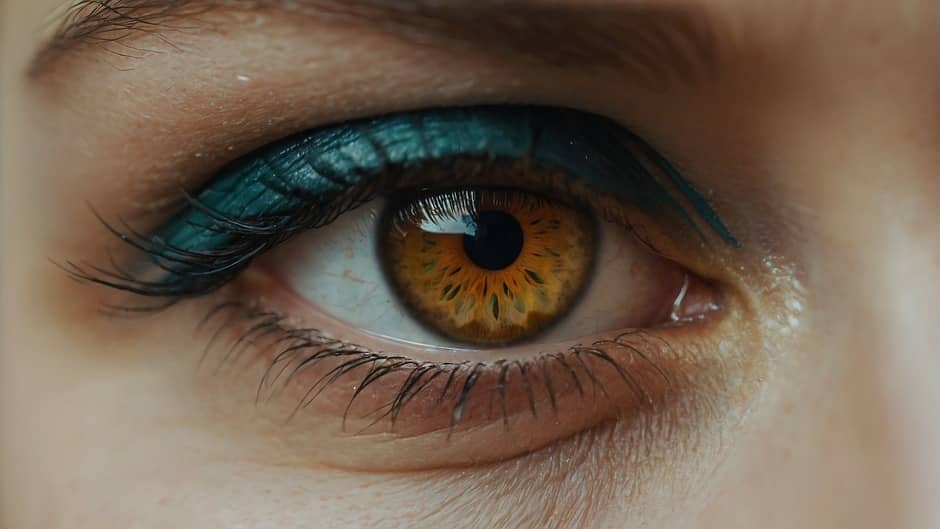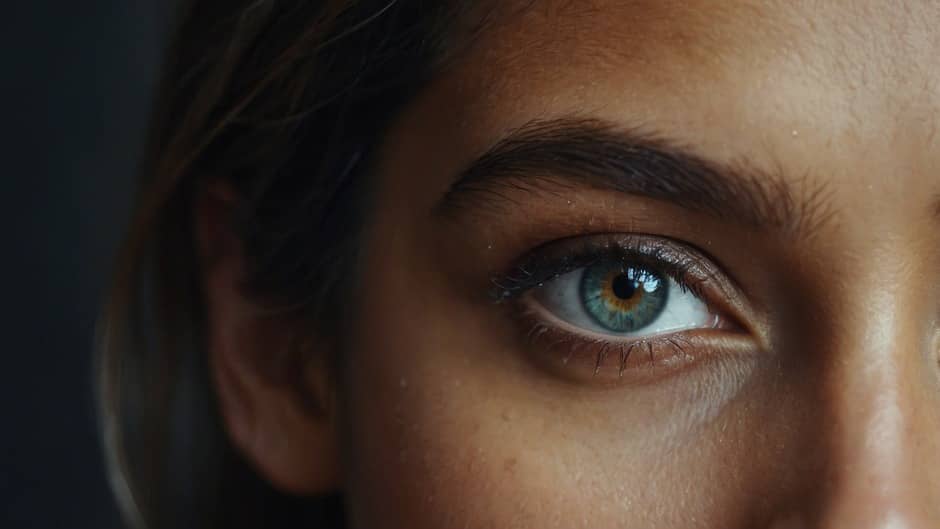Table of Contents
- What Causes Dry Eyes?
- Advanced Treatments for Dry Eyes
- Intense Pulsed Light (IPL) Therapy
- Ayurveda’s Holistic Approach
- Practical Tips for Everyday Relief
- Living with Dry Eyes
- Ayurvedic Home Remedies for Dry Eye
- Ghee Application
- Triphala Wash
- Castor Oil Drops
- Cucumber Slices
- Rose Water
- Ayurvedic Treatments for Dry Eye Syndrome
We should continue our conversation about dry eyes by delving further into some of the additional medications and causes that are probably not going to be looked at as frequently.
Understanding what might be aggravating your dry eyes is crucial because it will help you choose the right treatment or lifestyle adjustments to effectively manage the issue.
Let’s see how to have good eye health?
What Causes Dry Eyes?
There are numerous causes of dry eyes.
One important consideration is age.
People over 50 are more likely to experience dry eyes since aging causes our bodies to lose its capacity to make tears. However, the negative consequences of dry eyes are not limited to older adults.
Environmental factors that contribute to tear dissipation include wind, smoke, warmth, and cold. These factors might make your eyes feel dry and uncomfortable.
Hormonal fluctuations can also result in dry eyes, particularly in women.
This is a common occurrence, particularly in the case of pregnancy, menopause, or birth control pill use.
Hormone fluctuations might throw off the balance, as they have a significant impact on the production of tears. Prescription medications may also cause dry eyes.
The makeup of your tears can change or be reduced by some acne treatments, antihistamines, antidepressants, blood pressure pills, and other medications. See your doctor to find out if there are any other options if you believe your medicine is having an adverse effect on your eyes.
Dry eyes can also be a symptom of immune system disorders such as lupus, rheumatoid arthritis, and Sjögren’s syndrome.
Under these conditions, the body’s moisture-producing organs, including the tear ducts, are mistakenly targeted by the immune system. In many cases, the only way to relieve the symptoms of dry eye is to address the underlying ailment.
Advanced Treatments for Dry Eyes
There are more advanced options available for people with dry eyes who are conscientious and don’t respond to conventional medications. Let’s talk about a few that have shown potential lately.
Intense Pulsed Light (IPL) Therapy
Since IPL therapy was first created for skin treatments, it has been modified to treat dry eyes, especially those brought on by Meibomian Gland Dysfunction (MGD).
When your eyelid glands don’t generate enough or of low quality oil, MGD happens. This oil is vital because it prevents your tears from evaporating too quickly.
IPL treatment helps to improve gland function and reduce inflammation.
- Scleral Lenses
These are amazing contact points that create a vault of tears over your cornea to keep it wet all the time. They are particularly beneficial for those with keratoconus or very dry eyes. Scleral foci can be revolutionary for those who haven’t found relief with alternative medications.
- Probing and Expression
Using tiny instruments, a doctor opens the clogged Meibomian glands and then gently squeezes them to release the oil. It’s like cleansing those little glands thoroughly. All of these can improve the type of oil in your tears and lessen adverse consequences.
- Regener-Eyes
This technique is more modern and uses eye drops made from human amniotic fluid. The purpose of these drops is to help regenerate the surface of the eye, which will promote healing and decrease inflammation. Although this is a relatively new field of treatment, some patients have reported notable benefits.
Ayurveda’s Holistic Approach
Even though we’ve talked about a few Ayurvedic medications, it’s important to remember that Ayurveda looks at the full person rather than just treating symptoms. Ayurveda suggests that dry eyes may indicate an imbalance throughout the body, not only in the eyes.
Ayurvedic doctors often advise lifestyle modifications in addition to remedies like triphala and ghee.
Diet
Eating healthily is essential for maintaining the balance of your doshas, according to Ayurveda. To help with dry eyes, you may be told to incorporate dairy, cucumbers, melons, and other moist and cooling items in your diet. Additionally, as they can cause the body to feel dry, meals that are very hot, dry, or salty should be avoided.
Hydration
While it’s crucial to get adequate water, Ayurveda also discusses how to drink it. To keep your body hydrated, it’s advised that you sip warm water frequently throughout the day as opposed to a large amount of cold water all at once.
Stress Management
One of the key factors believed to influence your dosha is stress. Practices such as yoga, meditation, and breathing exercises are often recommended to manage anxiety, which can help to manage side effects such as dry eyes.
Also Read – How To Treat Tension Headaches At Home? – Relieve A Tension Headache Fast? (2024)
Practical Tips for Everyday Relief
- The 20-20-20 Rule
This simple rule is quite beneficial for anyone who spends a lot of time in front of a screen. Every 20 minutes, take a 20-second pause to gaze at somewhere 20 feet away. Blinking keeps your eyes moisturised and eases eye strain.
- Omega-3 Fatty Acids
These solid fats, which are present in flaxseed and fish oil, help to maintain the oil layer that prevents dissipation, which can help to modify the type of your tears. Eating more omega-3 fatty acids is a simple approach to keep your eyes healthy.
- Eyelid Hygiene
To prevent oils and other debris from obstructing your tear ducts, keep your eyelids clean. To do this, use pre-dampened eyelid wipes (available without a prescription) or gently wash your eyes with a mild, kid-friendly cleanser.
- Avoiding Air Blasts
Direct exposure to the air from fans, car heaters, or air conditioners can cause your eyes to become dry very rapidly. Try to steer these air sources away from your face, or block the airflow with a shield like glasses.
Living with Dry Eyes
Living with dry eyes can be challenging, but with the correct care, you can manage the symptoms and maintain a high standard of living.
The most important thing is to determine what works best for you, whether that is applying modern medical techniques, combining Ayurvedic traditions, or a combination of the two. It’s also a good idea to see a doctor before beginning any new treatment if your symptoms are severe or getting worse.
By continuing to learn and take action, you can take control of your eye health and maintain clear, comfortable vision.

Ayurvedic Home Remedies for Dry Eye
We ought to talk about something that many of us have experienced at some point: dry eyes. You know how uncomfortable it is to have dry, itchy, or just weary eyes?
As it happens, there are several amazing Ayurvedic remedies that can help relieve those itchy, dry eyes. Another lovely thing about Ayurveda is its emphasis on gentle, natural approaches to maintain the health of our bodies.
Now, let’s begin with some potentially helpful treatments and therapies.
Ghee Application
First is ghee. Although you may be familiar with ghee as a cooking ingredient, Ayurveda uses it for much more.
Clarified butter, or ghee, is said to be a powerful remedy.
For dry eyes, dabbing a tiny bit of heated ghee into or around your eyes can be quite calming.
Because ghee contains natural lipids, it lubricates the eyes naturally, relieving dryness and inflammation. Though it may seem strange, applying butter around your eyes has been done for ages and offers several well-being benefits.
Triphala Wash
Next, let’s discuss Triphala.
This traditional Ayurvedic herbal blend contains three fruits: Amalaki, Bibhitaki, and Haritaki.
Its cleansing qualities make it a popular choice for a general health tonic. For dry eyes, prepare an eye wash with triphala. All you have to do is soak the Triphala powder in hot water, let it cool, and then use it to gently clean your eyes.
If your eyes are feeling irritated, the home-grown wash helps remove pollutants and has a negating effect, which may be very soothing.
Castor Oil Drops
Castor oil is an additional really good remedy. It is well known for treating a number of ailments, such as skin and intestinal problems, but it also effectively treats dry eyes.
Pure castor oil that has been cold-pressed can be used to make eye drops. Each eye might benefit from a single drop to help lubricate and lessen discomfort.
Normal mitigating qualities of castor oil help to secure in moisture by framing a protective layer over the eye. It’s a simple, natural technique to maintain eye comfort.
Also Read – Best Home Treatment For Skin Rashes – What Food Allergies Cause Skin Rashes? (2024)
Cucumber Slices
Slices of cucumber should not be disregarded.
There’s a good reason why these are frequently seen in spa pictures! Numerous cooling and moisturizing qualities are associated with cucumbers. You can immediately relieve dryness and minimize inflammation by applying a few slices to your closed eyes.
The coolness of the cucumber and its moisture content might help rehydrate the skin around your eyes.
Rose Water
Rose water is an additional helpful choice.
Rose water’s mild qualities allow it to be used as an eye rinse or rubbed with a cotton pad to closed eyes.
It cools and refreshes the eyes, reducing inflammation and redness. Rose water can help remove any residue or particles that might be irritating your eyes because it has a slight astringent effect. Additionally, the aroma of rose water is typically calming, so it’s a good addition to your daily self-care routine.
Ayurvedic Treatments for Dry Eye Syndrome
If you’re looking for something a little more regimented, Ayurveda provides specific medications for more stubborn cases of dry eye.
I will briefly describe these remedies, which are usually administered under the guidance of a qualified Ayurvedic practitioner.
Medicated ghee is given to the eyes in the interesting Netra Tarpana treatment.
Each eye has a small, batter-made enclosure around it. Warm ghee is carefully poured within, allowing the eyes to absorb it.
This very nourishing treatment may greatly lessen dryness and enhance the condition of the eyes.
Medicated oils are applied through the nose in Nasya Therapy.
Given that Ayurveda holds that everything is interconnected, you may be asking how this relates to your eyes. By treating the nasal passages, Nasya can help reduce dryness and enhance moisture retention in the eyes.
A comprehensive approach addresses the underlying causes of dry eyes rather than just its symptoms.
Another Ayurvedic technique is Anjana, which involves directly applying natural details to the eyes.
These preparations help to strengthen and clean the eyes, which lessens dryness and improves overall eye health. It’s like doing a mini workout and purification all at once for your eyes.
Triphala Ghrita is the name of a specific recipe that uses triphala and ghee. It’s applied topically and brought indoors.
When applied as an ocular drop, it can alleviate and moisturize dry eyes. Internally, it functions as a general tonic for the body, promoting overall eye health.
Not to mention, Shirodhara is a very soothing treatment that involves putting a stream of heated herbal oil on your forehead continuously. Shirodhara can assist indirectly by encouraging relaxation and easing tension that may be impacting your eyes, as stress is frequently a contributing factor to dry eyes.
This therapy is renowned for its capacity to induce mental calmness.
Read us on Medium.




